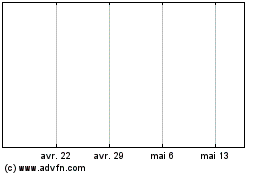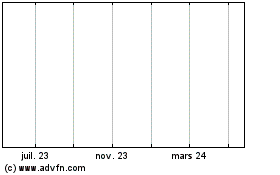Discover Bank Announces Impact of Spike in Bankruptcy Notices Preceding New Federal Legislation
31 Octobre 2005 - 11:57PM
Business Wire
Morgan Stanley (NYSE: MWD) (the "Company") today announced that
Discover Bank, similar to other credit card issuers, has received a
spike in bankruptcy notices as a result of the new Federal
bankruptcy legislation that became effective on October 17, 2005.
According to the National Bankruptcy Research Center, bankruptcy
filings industry-wide increased by approximately ten-fold in the
week preceding the legislation's effective date compared with
typical levels. While it is too early to quantify the benefits from
the new bankruptcy law, which makes it more difficult for
individual debtors with adequate means to discharge debts in
bankruptcy, the Company believes the long term impact on credit
quality for the credit card industry and Discover will be
favorable. Based on currently available information, the Company
expects that the pre-tax charges in the fourth quarter of fiscal
2005 resulting from additional bankruptcy notices will increase by
$200 to $250 million over those experienced in the third quarter of
fiscal 2005. This estimate includes a decrease in the value of the
Company's residual interest in credit card securitizations and
additional loan loss provisions for owned credit card receivables.
The Company believes that this range represents in large part an
acceleration, triggered by the new bankruptcy legislation, of
charge-offs that otherwise would have occurred in the ordinary
course of business in fiscal 2006. The higher level of bankruptcy
notices received by Discover Bank will affect the Discover Card
Master Trust I ("DCMT"), a trust utilized by the Company to access
the securitization markets. The DCMT agreements require early
amortization of securities issued by the trust if the excess spread
(a measure of trust profitability as further defined in the DCMT
agreements) falls below a specified level over a three month
rolling average period. While the Company expects a decline in
excess spread in the near term, the Company does not expect that an
early amortization event will occur with respect to any outstanding
DCMT term asset-backed securities. The excess spread is expected to
recover in subsequent months as bankruptcy notices return to more
normalized levels. DCMT issues multiple series of securities. One
series that supports a short-term certificate program has an
additional provision with respect to the minimum level of excess
spread. Discover Bank today notified the trustee of the DCMT that
it was retiring the series to avoid a potential violation of the
excess spread provision. The result of this action will be to use
available trust collections to pay in full principal and interest
on the short-term certificates at maturity beginning on November
15, 2005. This will cause approximately $4 billion of credit card
receivables related to the series to be reflected on the Company's
statement of financial condition. The Company currently intends to
securitize the amount of receivables that were securitized in the
short-term certificate program, as well as approximately $1.5
billion of other maturing securitized receivables, through existing
markets during the first quarter of fiscal 2006. If the Company is
not confident at fiscal year end in its ability to securitize these
receivables by February 28, 2006 (90 days later), they will remain
on the Company's statement of financial condition and become
subject to the Company's reserving policies. This could increase
the loan loss provision by an additional amount of up to
approximately $250 million as of November 30, 2005. The amounts
discussed above are based on the Company's best estimates at this
time and may change as more information becomes available. About
Morgan Stanley Morgan Stanley is a global financial services firm
and a market leader in securities, investment management and credit
services. With more than 600 offices in 28 countries, Morgan
Stanley connects people, ideas and capital to help clients achieve
their financial aspirations. The information above contains
forward-looking statements. Readers are cautioned not to place
undue reliance on forward-looking statements, which speak only as
of the date on which they are made and which reflect management's
current estimates, projections, expectations or beliefs and which
are subject to risks and uncertainties that may cause actual
results to differ materially. In particular, the Company's ability
to access the markets for securitized receivables, its ability to
manage credit risk related to consumer debt and the actual rate of
bankruptcies experienced may cause the Company's actual results to
differ from the forward looking statements. Forward-looking
statements relating to excess spread are based on certain estimates
of yield, charge-offs, interest rates, payment rates, seasonal
purchasing practices and other matters which cannot be predicted
with certainty. For a discussion of additional risks and
uncertainties that may affect the future results of the Company,
including the Credit Services business, please see "Forward-Looking
Statements" immediately preceding Part I, Item 1, "Competition" and
"Regulation" in Part I, Item 1 and "Certain Factors Affecting
Results of Operations" in Part II, Item 7 of the Company's Annual
Report on Form 10-K for the fiscal year ended November 30, 2004
(the "2004 10-K") and "Management's Discussion and Analysis of
Financial Condition and Results of Operations" in the Company's
Quarterly Reports on Form 10-Q and other items throughout the 2004
10-K and Forms 10-Q.
Morgan Stanley (NYSE:MWD)
Graphique Historique de l'Action
De Déc 2024 à Jan 2025

Morgan Stanley (NYSE:MWD)
Graphique Historique de l'Action
De Jan 2024 à Jan 2025

Real-Time news about Morgan Stanley (New York Stock Exchange): 0 recent articles
Plus d'articles sur Morgan Stanley